My First Opera: Sister Helen Prejean
Before Dead Man Walking, I didn’t have much exposure to opera at all. When I was 15, my family took a trip to Europe and we went to the Baths of Caracalla to see Aida. All I remember about it is the spectacle, especially the camels on stage. I couldn’t tell you anything about the music. Years later, one of the sisters in my convent, an opera lover, took me to see La bohème at New Orleans Opera. The arias of Mimì and Rodolfo cut me wide open. I realized how susceptible I was to music.

But I still didn’t know anything about opera when I started working with Jake Heggie and Terrence McNally on Dead Man Walking, their adaptation of my memoir about working with death-row prisoners. When I first agreed to the project, I extracted two promises from Jake: 1) It would have to have the theme of redemption, and 2) It wouldn’t have that atonal stuff, where nobody can whistle the tunes.
I already knew from working with Tim Robbins on the movie version that my book had to be distilled in order to be shaped into dramatic form. We had to get to the essential struggle: If someone hurts me or somebody I love, how do I heal from that, and get away from the idea that I should hurt that person as I’ve been hurt? This is the fullness of opera: It can bring people closer to that reality. You don’t just have live drama; you have music to instruct the heart.
When he was working on the libretto, Terrence asked me if I had forgiven the murderers. “It’s not for me to forgive; it’s for the victims’ families, and God.” He didn't buy that. On reflection, I realized that a part of me had to forgive. The most profound experience with people who have done terrible acts is to experience their dignity — the transcendence of their existence.
Flicka — Frederica von Stade — played Mrs. De Rocher at the San Francisco Opera premiere. Since I wasn’t an opera fan, I really didn’t know her from a hole in the wall. But we’ve become friendly, and I’ve seen her over the years. Honest to goodness, what a beautiful woman! So much warmth and generosity. I’ve recently been looking at her clips on YouTube. Just to see her perform, with that voice — clear as a bell — and that control is a revelation. She is as outstandingly beautiful in her voice as in her person.
Experiences like that bring me to the height of appreciation for the humility of performers. They have put hours and hours and hours of practice into developing a fine-tuned instrument. It lets them be part of an ensemble of talented, dedicated people to give the art form of opera to the world. I stand in awe of them.
At the San Francisco world premiere, Susan Graham was Sister Helen, and in between performances, her father died. She had brought nurses around his hospital bed and sung Dead Man Walking’s “God will gather us around.” After his death, she came back to do the last performance. I saw her just before, but I didn’t want to say too much, because she was so fragile. In the Epistle to the Philippians, there’s a line “Christ emptied himself,” and that’s what I saw Susan do that night. At the end of the opera, hers is the last “Gather all around,” a capella, and when the curtain fell, she collapsed in a pool of tears. How she did that performance, I don’t know. To be able to give yourself to an audience and to leave tragedy behind — that’s really dedication.
I’ve seen Dead Man Walking at least 20 times since then — all over the United States, and in Adelaide, Madrid and Dresden. It never gets old for me. The thing that always moves me is the minute and half of silence at the end. The journey’s all done. Now we have to witness the so-called justice, and it’s done in silence, so all we hear is the machinery of death. Jake said, “I want people to hear the sound of their own heart beating.” The witnessing is the thing that I’m most happy about. It gets people close to a ritual they would never otherwise see. It makes you think about the euphemism of “execution.” You execute a business plan; you execute a forward pass in football. The death certificate is the truth-teller: “Cause of death: homicide.”
I haven’t seen much other opera. I’m so busy. I spend much of my time writing letters to people on death row, some of whom are innocent. I would like to go to plays, but I don’t; I don’t even have time to watch the New Orleans Saints. When I’m an old lady…maybe then.
Sister Helen Prejean’s most recent book is River of Fire: My Spiritual Journey.
This article was published in the Winter 2020 issue of Opera America Magazine.





